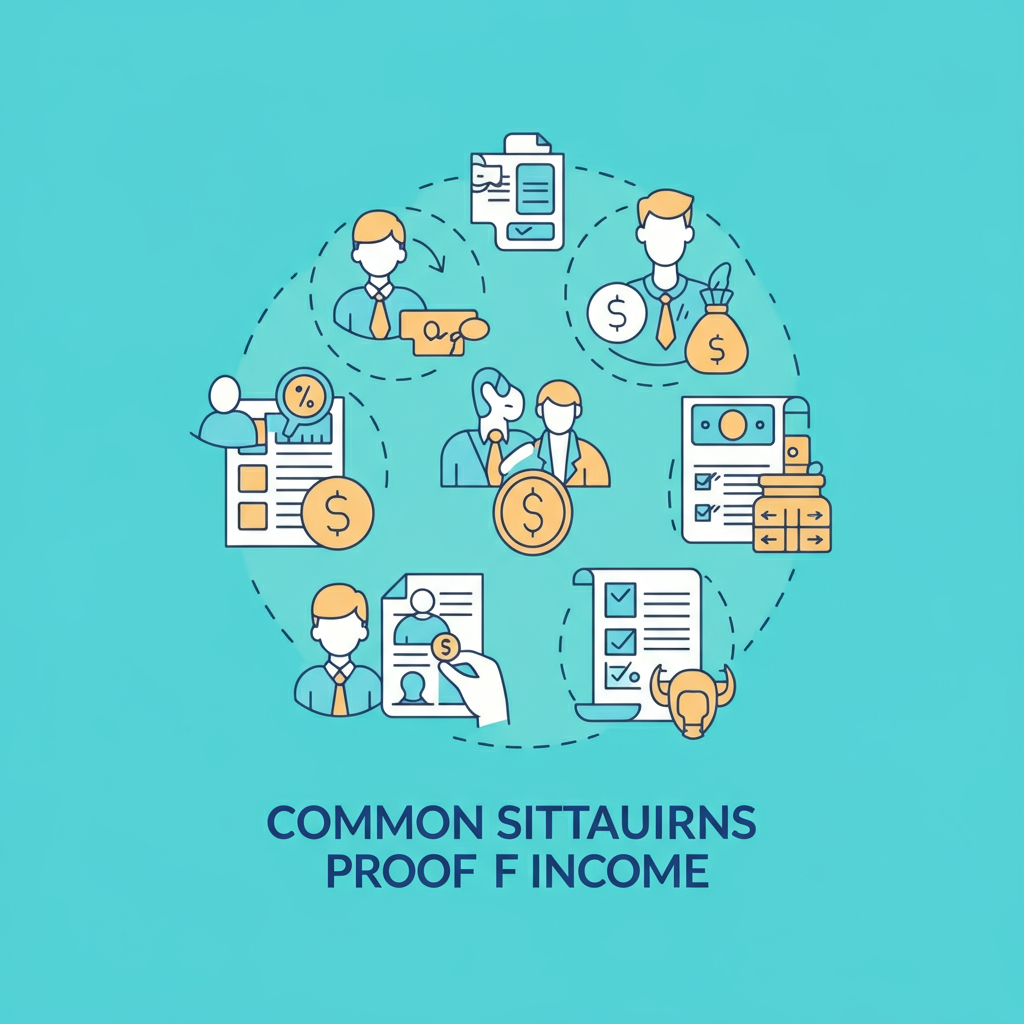Navigating life’s many financial checkpoints often requires one crucial piece of information – proof of income. Whether you’re applying for a loan, renting an apartment, or securing a new job, proof of income is the golden ticket that verifies your financial stability. But what exactly is proof of income, and which documents can serve this purpose? This comprehensive guide will explore what proof of income is, why it’s essential, and the 10 most common types of documents you can use to verify it.
What Is Proof of Income?
Proof of income is any document or set of documents that verifies an individual’s earnings or financial stability. Simply put, it’s evidence that you generate income to support yourself. This information is often provided to landlords, lenders, or employers who need assurance that you can fulfill financial obligations, like paying rent, repaying loans, or handling responsibilities tied to employment.
The documents used as proof of income vary depending on your job, financial situation, and the requesting party’s requirements. From pay stubs to tax returns, proof of income documents paint a clear picture of both your earnings and financial dependability.
Why Is Proof of Income Important?
Providing proof of income plays a pivotal role in many situations because it helps third parties assess your financial credibility. Here’s why it matters:
- For Renters: Proof of income reassures landlords that you can afford monthly rent payments.
- For Borrowers: Lenders rely on income verification to evaluate your eligibility and loan repayment ability.
- For Employers: Proof of income can serve as verification during background checks or new employment onboarding.
Beyond these scenarios, proof of income is often tied to financial accountability and trustworthiness, allowing institutions and professionals to make informed decisions about working with or assisting the individual.
Common Situations Requiring Proof of Income

You might need to provide proof of income in various contexts. Here are some of the most common scenarios:
- Applying for a loan or mortgage
- Renting an apartment or leasing a vehicle
- Securing new employment
- Opening certain financial accounts, such as credit cards
- Negotiating payment plans for medical or retail expenses
- Filing for government assistance or benefits
- Immigration or visa applications
Now that we’ve covered the basics, it’s time to dig into the specifics.
10 Document Examples for Proof of Income
If you’re scratching your head wondering where to get proof of income, don’t worry. Below, you’ll find ten commonly accepted document types, all capable of serving as income verification.
1. Pay Stubs
Pay stubs are one of the most straightforward and widely accepted forms of proof of income. These slips, provided by your employer, detail your earnings, deductions, and net income over a designated pay period.
2. W-2 Forms
Received annually, W-2 forms are issued by employers to summarize an employee’s total earnings and tax contributions for the year. These are especially useful when applying for long-term loans or mortgages.
3. Tax Returns
Tax returns, which document your income over an entire year, are commonly used by self-employed individuals who may not have pay stubs. They also provide a snapshot of additional earnings or deductions.
4. Bank Statements
Bank statements offer a broader financial perspective by reflecting all income deposited into your account. They’re particularly useful for freelancers or contractors who don’t receive traditional pay stubs.
5. Employment Contracts
An employment contract outlines details about your salary or hourly rate, along with terms of employment. This document is often submitted as proof for new renters or utility account setups.
6. Offer Letters
If you’re starting a new position, your offer letter can temporarily serve as proof of anticipated income. This document is typically accepted in conjunction with a bank statement or other supplementary form of verification.
7. Self-Employment Income Records
For freelancers and self-employed individuals, invoices, profit-and-loss statements, or a 1099 form can showcase your earnings. It’s essential to keep organized financial records if you’re self-employed.
8. Pension Statements
If you’re retired, a pension statement can verify your regular income. Many pension providers include monthly or annual reports that confirm your income source and amounts received.
9. Social Security Statements
Individuals receiving Social Security benefits, such as retirement or disability assistance, can provide their annual Social Security statement as proof of income.
10. Investment Income Statements
Investment income, such as dividends or profits from rental properties, can also serve as income validation. Maintaining detailed records from stocks, bonds, or properties you own is crucial when using these.
Table Summary of Document Examples for Proof of Income
| Document Type | Key Uses | Suitable For |
|---|---|---|
| Pay Stubs | Rent/loan applications | Salaried employees |
| W-2 Forms | Loans, mortgages | Salaried employees |
| Tax Returns | Long-term financial proof | Self-employed/freelancers |
| Bank Statements | Verifying all deposits | Various |
| Employment Contracts | Rent/employment setup | New hires |
| Offer Letters | Anticipated income proof | New job starters |
| Self-Employment Records | Income tracking | Freelancers/self-employed |
| Pension Statements | Retirement income confirmation | Retirees |
| Social Security Statements | Benefits income | Retirees/disabled |
| Investment Income Statements | Passive income applications | Investors |
How to Obtain These Documents
Acquiring proof of income documents is often straightforward. Below are common ways to obtain each type:
- Pay Stubs and W-2 Forms: Request directly from your employer or download via company payroll software.
- Tax Returns: Access through your IRS account or consult your accountant.
- Bank Statements: Retrieve through your online banking portal.
- Self-Employment Records: Use bookkeeping tools like QuickBooks or Xero to generate reports.
- Government Benefit Reports: Access via Social Security office websites or pension providers.
What to Do If You Can’t Provide Standard Documentation
If you don’t have traditional proof of income, don’t panic. There are alternative methods you can use:
- Create Affidavits: A sworn statement detailing your income sources, verified by a notary.
- Co-Signer Options: Provide a guarantor to back up your financial claims.
- Professional Recommendations: Ask for letters from contractors or accountants who can vouch for your income.
These alternatives are particularly helpful for freelancers, independent contractors, or individuals undergoing financial transitions.
People Also Ask About Proof of Income
Can I use cash income as proof of income?
Yes, but you’ll need to document it. Bank deposits, invoices, or employer statements are good ways to verify cash income.
Do credit checks need proof of income?
Some do. While soft inquiries won’t typically require proof of income, hard inquiries for loans might.
Are digital payments considered proof of income?
Yes, in many cases. Receipts from platforms like PayPal or Venmo can serve as proof if they show consistent earnings.
How much proof of income is usually required for rent?
Generally, landlords require proof that your income is 2-3 times the monthly rent amount.
Building Trust With Verified Documentation
Providing proof of income is essential for securing financial trust and navigating modern life. Being proactively prepared with the right documentation can save you time, stress, and hassle. Whether you’re renting a new apartment, securing a personal loan, or entering a job, proof of income is your ticket to credibility.
Equip yourself with the tools you need by acquiring and organizing these documents today.
